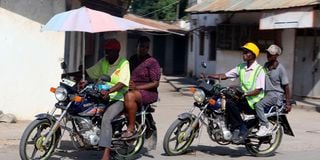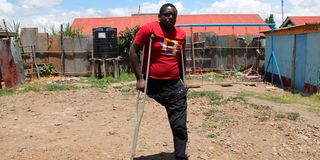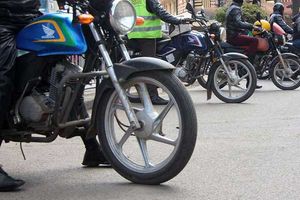
Boda boda operators at Changamwe area in Mombasa in this photo taken on February 24, 2024.
A 2008 government policy to zero rate motorcycles of up to 250cc has led to a 1,773 percent increase in the number of registered motorcycles in Kenya, an analysis of data shows.
Statistics from the National Transport and Safety Authority shows that the number of registered motorcycles in 2008 was 130,307, the figure hit the one million mark in 2016 and by 2022 the number was at 2,394,317.
While the data does not specify how many of these motorcycles are used in the boda boda business, a 2022 study by Car and General -which sells motorcycles and their spare parts- showed that nine out of 10 motorcycles in the country are used for commercial purposes mainly in the boda boda sector.
When the late president Mwai Kibaki introduced the policy, the number of imported units increased by 154 percent from 29,072 in 2007 to 73,995 in 2008. The number has continued to increase steadily each year and by 2022, the number stood at 321,155.
The sector has mainly benefitted the youth as high unemployment rates among young people has driven many to embrace boda bodas as a source of employment.
Car and General estimates that there are about 1.2 million riders each earning an average of Sh1,000 per day from an average of 15 rides, translating to Sh1.2 billion daily.
But this booming sector has largely remained unregulated and boda bodas are still not legally recognised as public service vehicles despite their connection with the general public and their safety.
A 2018 report by the National Crime Research Center noted that while boda bodas have significantly improved the livelihood of many Kenyans, they have also caused increased accidents due to reckless riders and been used in criminal activities.
“In spite of the many positive contributions of boda bodas in the public transport sector, this research found out that boda bodas have not only compounded road safety concerns in Kenya, but also brought along with it serious security challenges in terms of crimes. Road accidents and crime were flagged out by respondents as the major issues of concern with boda bodas,” the report read.
Data from the Kenya National Bureau of Statistics (KNBS) shows that the number of motorcycles primarily responsible during an accident have increased from 822 in 2019 to 2,706 in 2022.
A total of 5,973 motorcyclists have died through road accidents between 2016 and 2022 while 2,336 pillion passengers have also lost their lives during the same period.

Mr Lemmy Kathurima who lost his right leg following a boda boda accident in March 2021 along the Nanyuki-Naromoru road. A total of 5,973 motorcyclists have died through road accidents between 2016 and 2022 while 2,336 pillion passengers have also lost their lives during the same period.
Incidents such as the heinous attack on a woman by boda boda riders along Prof Wangari Maathai Road on March 8, 2022 highlight how the sector has also become a law unto themselves.
The woman, who was a foreign national, in a police statement said she was blocked by a boda boda rider causing her to hit the rider leaving him injured but once she stopped a few meters away, an angry mob of riders began attacking her and robbing her.
All this while, one of the riders was recording her ordeal. The video began circulating online which sparked outrage leading to former President Uhuru Kenyatta calling for a nationwide crackdown on boda bodas that left many of them impounded.
“Riding a boda boda is not a license to do drive-by shootings, and most definitely not for you to strip and remove dignity from our women. We want to support our boda bodas, but even these women are your customers. Treat them with respect,” Mr Kenyatta said at the time.

Zachary Nyaoga Obadia. He has been identified by police as the mastermind of a gang that sexually harassed a motorist along Forest Road.
Former Chief of Defence Forces Julius Karangi in 2020 also narrated how his car was almost razed down by boda boda riders in Nyeri after an accident caused by one of them.
He explained how after a boda boda rider rammed into the rear of his car, around 50 other riders gathered at the scene and started threatening to lynch him and raze his car.
Were it not for how well known he is, he would have probably suffered the same fate of the woman attacked along Prof Wangari Maathai Road.
“I all along kept my cool and when I deduced they were now about to make their threats real, I lowered my mask and made a rough scanning move on the mobs and it registered in some of them that I was Karangi. Hushed words were exchanged and the riders together with their threats just vanished,” he said.
He noted how the mob of riders did not even try to get to know what had happened before they arrived at the scene.
“Here was a straight case of a reckless motorcycle rider who had sped right onto my car’s rear. I was the aggrieved and his colleagues' mentality of solidarity was to punish me regardless. This is what many Kenyans go through in the hands of these youth,” he added.
But the lawlessness of the boda bodas that includes driving on pavements, not following traffic lights and driving against traffic is something that can be changed.
Boda-boda riders on the newly created walkways along Muindi Mbingu Street.
Neighbouring Rwanda has got it right with managing this transport sector.
Riders in the country are required to wear helmets and reflective jackets with a unique identifying number that is also written on the bike.
The motorcycles are also fitted with a GPS locator for easy tracking as required by law. They are also required to belong to a cooperative that ensures they observe road discipline and adhere to traffic rules.
Cyclists and pillion passengers are expected to wear helmets and only one passenger can be ferried at a time.
In January 2022, Kigali further streamlined the sector by mandating all riders to migrate to a cashless payment system that ensures fare is based on distance travelled ending fare haggling between cyclists and their passengers.
The order in the sector in Rwanda seems like a pipe dream in Kenya. In the streets of the Nairobi Central Business District, pedestrians walk in fear because a motorcycle could appear from any direction and hit them.
The motorcycles are strewn in every corner of the city and traffic police officers as well as county traffic marshals seem to not care about how rogue they have become.
A crackdown in 2022 to ensure all riders were registered left much to be desired as many of the boda boda riders are still not registered and do not even have valid licenses.
To register as a boda boda rider, the government requires all riders to belong to a sacco or an association, have a valid driving license, a national identification card and a KRA pin certificate.
Once a rider applies at a Huduma centre, the documents are verified before a license is issued after two to three weeks.
In March 2022,the government made the registration free for a period of two months and even offered the first 200,000 riders free one year NHIF cover and free training by the National Youth Service.
Despite all these measures, the number of new registrations declined in comparison to the previous year. In 2022, only 131,513 new motorcycles were registered compared to 285,203 in 2021.










